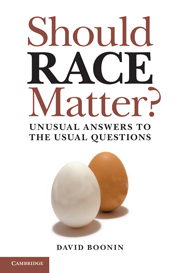Book contents
- Frontmatter
- Contents
- Preface
- 1 Thinking in Black and White
- 2 Repairing the Slave Reparations Debate
- 3 Advancing the Slave Reparations Debate
- 4 One Cheer for Affirmative Action
- 5 Two Cheers for Affirmative Action
- 6 Why I Used to Hate Hate Speech Restrictions
- 7 Why I Still Hate Hate Speech Restrictions
- 8 How to Stop Worrying and Learn to Love Hate Crime Laws
- 9 How to Keep on Loving Hate Crime Laws
- 10 Is Racial Profiling Irrational?
- 11 Is Racial Profiling Immoral?
- Notes
- Sources
- Index
6 - Why I Used to Hate Hate Speech Restrictions
Appeals to Traditional Exceptions to Freedom of Expression and Why They All Fail
Published online by Cambridge University Press: 05 June 2012
- Frontmatter
- Contents
- Preface
- 1 Thinking in Black and White
- 2 Repairing the Slave Reparations Debate
- 3 Advancing the Slave Reparations Debate
- 4 One Cheer for Affirmative Action
- 5 Two Cheers for Affirmative Action
- 6 Why I Used to Hate Hate Speech Restrictions
- 7 Why I Still Hate Hate Speech Restrictions
- 8 How to Stop Worrying and Learn to Love Hate Crime Laws
- 9 How to Keep on Loving Hate Crime Laws
- 10 Is Racial Profiling Irrational?
- 11 Is Racial Profiling Immoral?
- Notes
- Sources
- Index
Summary
Two students are walking across different parts of the same campus. Each passes a fellow student that he strongly dislikes. The first insults the student he encounters by calling him a fat and ugly asshole. The second insults the student he encounters by calling him a fat and ugly nigger. Because the college in question has a policy prohibiting hate speech, the second student is punished for his use of offensive language while the first student isn’t. Meanwhile, two arsonists are walking around different parts of the same state. Each is planning to burn down someone’s house and each is trying to find a suitable house to target. The first ends up selecting a particular house because it’s a bit more convenient to get to than others in the area. The second ends up selecting a particular house because the family who lives in it is black. Both are caught and are punished for their acts. Because the state in question has a hate crime law, the second arsonist receives a greater punishment than the first.
These two pairs of cases have a number of things in common. In both pairs of cases, each person does something objectionable. In both pairs of cases, the kind of objectionable thing that the first person does is the same as the kind of objectionable thing that the second person does. In both pairs of cases, what the second person does involves targeting someone by race while what the first person does doesn’t involve targeting someone by race. And in both pairs of cases, there’s a policy in place that results in the second person receiving a particular kind of sanction that the first person doesn’t receive as a result of this fact.
- Type
- Chapter
- Information
- Should Race Matter?Unusual Answers to the Usual Questions, pp. 203 - 229Publisher: Cambridge University PressPrint publication year: 2011



